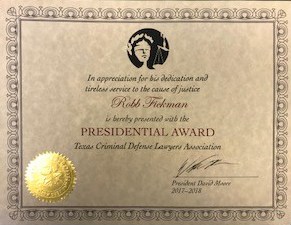What You Should Know About Your Federal Arrest in Texas
A person accused of a federal crime will be brought to court by arrest, voluntary surrender, or a summons.
Law enforcement will usually arrest an accused individual at their house. Typically, law enforcement will provide the accused with no advance warning when they are arrested. Law enforcement likes to arrest people early in the morning at their homes. However, law enforcement can arrest a person on a federal warrant at any location and any time.
When Law Enforcement Arrives
They will identify themselves as law enforcement to arrest someone and typically state their purpose. In some cases, law enforcement will politely knock on the door. In other cases, law enforcement will use force to gain immediate entry into the house, using the element of surprise to gain swift and safe apprehension of the accused.
When a Person is Arrested, They are Handcuffed and Searched
The person arrested is taken to a law enforcement vehicle and placed in the vehicle’s back seat. After law enforcement has completed the arrest and search incident to the arrest, the individual is transported either to the offices of the arresting agency or directly to the United States Marshal’s Office.
What a Person Should do When They are Making an Arrest
When law enforcement is making an arrest, it’s important for the accused to use good judgment.
- The accused should understand that law enforcement often has no idea whether the person is armed or dangerous. Consequently, the accused should follow all physical directives; Directives may include orders to lay flat on the ground, place one’s hand where one can be seen, or kneel. It is vitally important for everyone’s safety that the accused comply with the directives. The Accused should never ignore the directives, make sudden movements, or attempt to flee.
- The accused should always remember that they have a privilege under the Fifth Amendment not to incriminate themselves. This means the accused has the right to remain silent, which is exactly what the accused should do. Beyond confirming their identity, the accused should remain silent and decline to answer any questions.
- It is critical that the accused understand the importance of remaining silent. Often, accused individuals have answered law enforcement questions only to make matters far worse for themselves. Clients sometimes think they can “talk their way out of it.” This is a foolish notion.
Law enforcement has already determined that they believe the accused is guilty. They will likely have already spoken to a federal prosecutor. The accused is not going to talk their way out of it. So it is foolish and risky for the accused to talk or answer questions. Keeping one’s mouth shut until one has spoken to their own lawyer is almost always the safest course.
What a Person Should do When They are Arrested
Do not attempt to cut any deal with Federal Agents. It is not unusual for someone arrested by federal agents to try to entice the accused into cooperating in exchange for some benefit. The accused should not try to reach any agreement with federal agents. In this regard, it’s important to remember several key points:
- Federal agents have NO authority to bind the United States of America. Only a Federal Prosecutor or Assistant United States Attorney has the authority to make a deal on behalf of the Prosecution.
- Federal agents may attempt to persuade the accused that the federal agent can make a deal for the Government. The fact remains that this is untrue. A Federal Agent has no authority to bind the Government.
- In some circumstances, Federal agents are allowed under the law to make misrepresentations to the accused to get them to talk. Consequently, they may make promises that are simply untrue.
- If the accused wants to cut a deal to cooperate, there is a proper established procedure to do that. Cooperation agreements require the involvement of both the prosecutor and your defense lawyer. The arresting agents have no authority to enter into a cooperation agreement with the accused.
The accused should never attempt to reach their own cooperation agreement with the agents. No matter what the agents say, that is not the proper or legally binding way to establish a cooperation agreement. So keep your mouth shut.
Voluntary Surrender
Sometimes law enforcement will notify the accused’s lawyer or the accused that they must surrender voluntarily. This means the accused needs to come to the United States Marshal’s Office to turn themselves in because they have been charged with a federal crime. Voluntary surrender is not the norm. However, it is preferable to arrest.
When representing someone under federal investigation, I will typically try to obtain an agreement for my client to surrender voluntarily or to appear by summons. If I can arrange for voluntary surrender or appearance by summons, that is preferable to arrest.
Appearance by Summons
Sometimes, I may be able to arrange for my client to be summoned to court rather than be arrested. This is far more likely to happen if I am already communicating with the Government.
When an accused is summoned to court, they receive a written order, the summons. The summons is an order from the Magistrate to appear before the Magistrate on a certain date for an initial appearance. When representing someone, I try to arrange for either voluntary surrender or appearance by summons. Either is better than being arrested.
All Federal Court Proceedings Information













